Happy Valley, Hong Kong
| Happy Valley | |||||||||||||||||
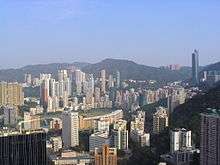 | |||||||||||||||||
| Traditional Chinese | 跑馬地 | ||||||||||||||||
|---|---|---|---|---|---|---|---|---|---|---|---|---|---|---|---|---|---|
| Literal meaning | horse-racing ground | ||||||||||||||||
| |||||||||||||||||
| Alternative Chinese name | |||||||||||||||||
| Traditional Chinese | 快活谷 | ||||||||||||||||
| Literal meaning | happy valley | ||||||||||||||||
| |||||||||||||||||
Happy Valley is an upper-income residential area in Hong Kong, located on Hong Kong Island. Administratively, it is part of Wan Chai District.
The area is sometimes known as Wong Nai Chung Kuk (黃泥涌谷) or Wong Nai Chung Valley because of the Wong Nai Chung (黃泥涌, lit. yellow mud stream) that leads into the area.
The area is home to the Happy Valley Racecourse, Hong Kong Racing Museum, Hong Kong Sanatorium and Hospital, and a number of cemeteries including the Hong Kong Cemetery.
Climate
Happy Valley is often a hot spot in Hong Kong. On August 8, 2015, Happy Valley recorded a temperature of 37.9 Celsius, making it the highest temperature recorded in Hong Kong.
History

The area now known as Happy Valley was formerly known as Wong Nai Chung Valley, where the Wong Nai Chung referred to is a mud-filled river collecting waters from the Wong Nai Chung Gap and surrounding area. The river nourished the rice paddies until the construction of Happy Valley Racecourse in 1846.
In early 1840, the British Army set a military camp in the area. However, the camp was later closed due to the increasing number of soldiers succumbing to malaria. The cause of malaria was unknown at the time and the soldiers apparently suffered a then-unknown fever. Early settlers had suggested the area to be used as a business centre, but the idea was shelved due to the valley's marshy environment, which was causing fatal diseases. The death rate in the area and Victoria City was high in the early colonial days, and the valley became a burial ground for the dead. As a result, the valley was renamed as Happy Valley, a common euphemism for cemeteries. In 1846, the British felt that the valley terrain was ideal for horse-racing, and thus cleared the paddy fields and developed the Happy Valley Racecourse. For this, the Wong Nai Chung river was redirected to the Bowrinton Canal, known as Ngo Keng Kan (鵝頸澗) locally, concurrent with reclamation of Wan Chai. The canal is now covered by Canal Road.
On 26 February 1918, there was a fire in the racecourse and claimed at least 590 lives. By the next day as many as 576 confirmed deaths were reported by the Hong Kong Telegraph. It was caused by the collapse of a temporary grandstand, which knocked over food stalls and set bamboo matting ablaze. Most of the dead bodies became unrecognizable and assumed to be "Chinese". They were buried in the nearby So Kon Po area (now the site of Hong Kong Stadium). A Chinese-styled memorial site known as "Race Course Fire Memorial" was built in the Chinese cemetery (now behind the east stand of the stadium).
In 1922, the Hong Kong Sanatorium and Hospital located in Happy Valley started operation.
On 19 December 1941, the Japanese Imperial Army entered the hill east of the valley and captured the British bunker on the strategic Wong Nai Chung Gap. Hundreds of soldiers lost their lives and dead bodies were thrown into the stream of Wong Nai Chung which would flow down the valley. The river passed through a pool (now Blue Pool Road) where tens of civilians were executed on the following days.
Characteristics

Happy Valley is made up of upper income residential areas, and its residents include of a mix of Hong Kong natives and foreigners. Two of the tallest residential buildings in Hong Kong, "Highcliff" and "The Summit" are located in Happy Valley facing Mount Nicholson.
Happy Valley is the location of six cemeteries. From south to north, they are the Jewish Cemetery, the Hindu Cemetery, the Parsee Cemetery, Hong Kong Cemetery, St. Michael's Catholic Cemetery, and the Muslim Cemetery.
The Hong Kong Racing Museum and the Happy Valley Racecourse, one of the two race tracks belonging to the Hong Kong Jockey Club headquarters, is in Happy Valley. Whenever a race runs, surrounding traffic patterns have to be changed: Cars will have to enter Happy Valley and the racecourse via Wong Nai Chung Road in a clockwise fashion, and the road may be heavily congested. The stadium lights in the racecourse illuminate nearby buildings even when the buildings themselves are unlit.
Happy Valley is also the home of Hong Kong First Division's Happy Valley Athletic Association.
Transport
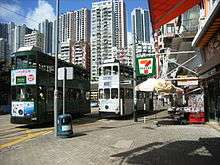

Hong Kong Tramways extended their network into Happy Valley in 1922,[1] and the community has been served by the trams ever since. The extension has one terminus.
Residents can access the Causeway Bay MTR station via minibuses or trams.
Aberdeen Tunnel, Wong Nai Chung Road and Canal Road Flyover also serve Happy Valley.
Happy Valley has three bus terminals, two at the top of the hill and one at the bottom. The terminus furthest up the hill serves route 19 that goes to Siu Sai Wan. The upper terminus (also on the hill) serves one of Hong Kong's oldest bus routes (No. 1) which spans from Green Lane of Happy Valley to Central; it now terminates at Kennedy Town. The lower bus terminus serves route 8X, going to Siu Sai Wan, route 117, going to Sham Shui Po, and route 10S, going to Kennedy Town.
Residential developments
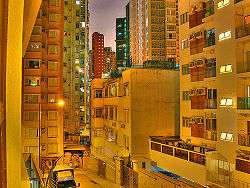
- Beverly Hill
- Beverly House
- Blue Pool Lodge
- Broad View Villa
- Broadville
- Broadwood Park
- Celeste Court
- Colonnade
- Comfort Mansion
- Friendship Court
- Gracedale
- Highcliff
- Hooley Mansion
- Horace Court
- Leighton Hill
- Panny Court billge pump
- Race View Apartments
- San Francisco Towers
- Splendour Court
- The Summit
- Valley View Terrace
- Ventris Court
- Ventris Place
- Victoria McKenna-Yao Holdings
- Villa Lotto
- Villa Rocha
- Village Terrace
- Winfield Building
Major roads and streets
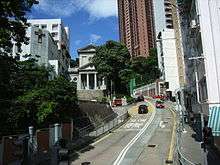
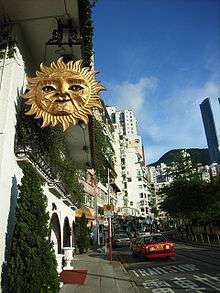
- Wong Nai Chung Road
- Sing Woo Road
- Blue Pool Road
- Ventris Road
- Shan Kwong Road
- Village Road
- Tsui Man Street
- Broadwood Road
- King Kwong Street
- Yik Yam Street
- Yuk Sau Street
- Stubbs Road
- Tai Hang Road
- Stubbs Circle
Education
The Lycée Français International Victor Segalen, the French international school, maintains its Blue Pool Road campus, housing the administration and secondary school, in Happy Valley.[2] The Hong Kong Japanese School's Happy Valley Campus is in the community.[3]
See also
| Wikimedia Commons has media related to Happy Valley. |
References
- ↑ hktramways
- ↑ "Campuses - Blue Pool Road." Lycée Français International Victor Segalen. Retrieved on 25 January 2015. "165 Blue Pool Road, Happy Valley"
- ↑ "About JIS" (Archive). Hong Kong Japanese School. Retrieved on 12 January 2015.
External links
 |
(Victoria Harbour) |  | ||
| Central and Western District | |
Eastern District | ||
| ||||
| | ||||
| Southern District |
Coordinates: 22°16′N 114°11′E / 22.267°N 114.183°E